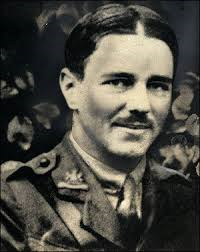Difference between revisions of "Wilfred Owen"
From QueerBio.com
| (One intermediate revision by the same user not shown) | |||
| Line 19: | Line 19: | ||
==Description== | ==Description== | ||
| − | One of the leading war poets of the First World War. Notable for "Dulce et Decorum Est", "Insensibility", "Anthem for Doomed Youth", "Futility" and "Strange Meeting". Killed in action. His realistic writing on the horrors of war contrasted with the popular patriotic verses of the day. Much of his poetry contains homoerotic overtones. Died in action in the last week of the Great War. Most of his poems were published posthumously. Recipient of the Military Cross. Had a close personal relationship with another war poet, [[ | + | One of the leading war poets of the First World War. Notable for "Dulce et Decorum Est", "Insensibility", "Anthem for Doomed Youth", "Futility" and "Strange Meeting". Killed in action. His realistic writing on the horrors of war contrasted with the popular patriotic verses of the day. Much of his poetry contains homoerotic overtones. Died in action in the last week of the Great War. Most of his poems were published posthumously. Recipient of the Military Cross. Had a close personal relationship with another war poet, [[Siegfried Sassoon]]. |
| + | |||
| + | ==See Also== | ||
| + | |||
| + | * [[LGBTQ War Poets and Artists]] | ||
==Further Reading/Research== | ==Further Reading/Research== | ||
Latest revision as of 01:34, 27 January 2015
Contents
Country
Great Britain
Birth - Death
1893 - 1918
Occupation
Poet
Notable Achievements
MC
Description
One of the leading war poets of the First World War. Notable for "Dulce et Decorum Est", "Insensibility", "Anthem for Doomed Youth", "Futility" and "Strange Meeting". Killed in action. His realistic writing on the horrors of war contrasted with the popular patriotic verses of the day. Much of his poetry contains homoerotic overtones. Died in action in the last week of the Great War. Most of his poems were published posthumously. Recipient of the Military Cross. Had a close personal relationship with another war poet, Siegfried Sassoon.

